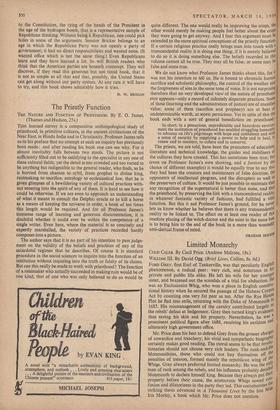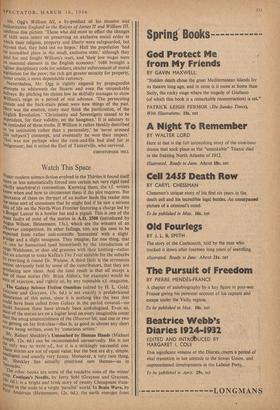Limited Monarchy
COLD CALEB. By Cecil Price. (Andrew Melrose, 18s.) FORD GREY, first Earl of Tankerville, was that peculiarly English phenomenon, a radical peer: very rich, and notorious in 1115 private and public life alike. He left his wife for her younger sister, and brazened out the scandals of a trial for abduction. He was an Exclusionist Whig, who won a place in English constitu• tional history when he secured the passage of the Habeas CorPtis Act by counting one very fat peer as ten. After the Rye Notts! Plot he fled into exile, returning with the Duke of Monmouth 111 1685. His mismanagement of the cavalry contributed largely 1° the rebels' defeat at Sedgemoor. Grey then turned king's evidence, thus saving his skin and his property. Nevertheless, he was prominent political figure after 1688, receiving his earldom an ultimately high government office. Mr. Price does his best to defend Grey from the grosser charges of cowardice and treachery; his vivid and sympathetic biograPhY certainly makes good reading. The moral seems to be that revolt!.• tionaries should not choose very rich leaders. The rank-and-file Monmouthites, those who could not buy themselves off t!1,0 penalties of treason, formed mainly the republican wing of t", Whigs. Grey always preferred limited monarchy. He was the on.y)(ji man of rank among the rebels, and his influence probably dectdel. Monmouth to declare himself king. Because they always put thel. property before their cause, the aristocratic Whigs sowed 011
„
, fusion and dilatoriness in the party they led. This corroborates t17. striking thesis advanced in A Thousand Lives by the late MI' Iris Morley, a book which Mr. Price does not mention. Mr. Ogg's William III, a by-product of his massive and authoritative England in the Reigns of James II and William III, Confirms this picture. 'Those who did most to effect the changes of 1688 were intent on preserving an exclusive social order in \v, bleh their religion, property and liberty were safeguarded, but beyond that, they held out no hopes.' Half the population `had 110 accredited place in the small, exclusive state,' although they Paid for and fought William's wars, and 'their low wages were 'In essential element in the English economy.' 1688 brought a lighter disciplinary code for soldiers, stricter enforcement of moral legislation for the poor; the rich got greater security for property, better credit, a more dependable currency. Nevertheless, Mr. Ogg is rightly angered by propagandist attempts to whitewash the Stuarts and even the unspeakable Jeffreys. By pitching his claims low he skilfully manages to show William's reign as a period of real advance. `The persecuting Prelate and the back-stairs priest were now things of the past. Here was the essence, many may think the justification, of the E nglish Revolution.' Christianity and Sovereignty ceased to be dependent, for their validity, on the hangman.' It is salutary to be reminded of these truths. If William is rather bleakly described r 4S. 'an institution rather than a personality,' he 'never aroused ..111,1s subjects
1 contempt, and eventually he won their respect.'
T was not perhaps what the rank-and-file had died for at Sedgemoor; but it suited the Earl of Tankerville, who survived.
CHRISTOPHER HILL



































 Previous page
Previous page